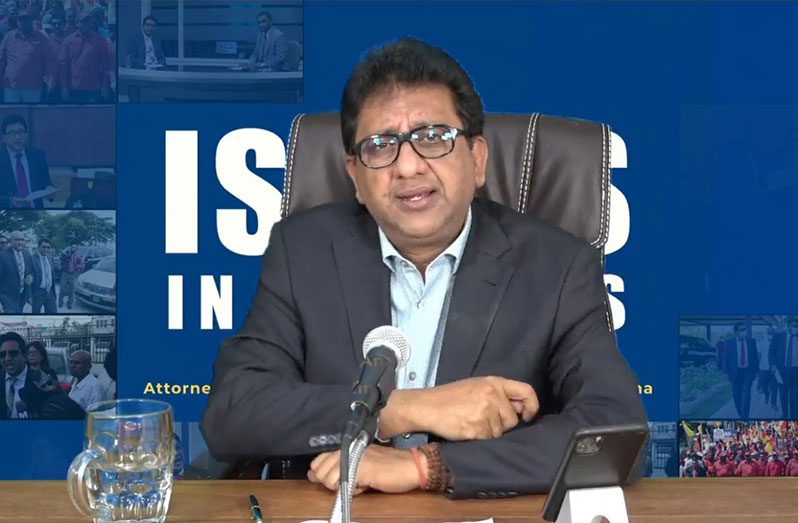-AG says
AS local and foreign investors anxiously await the start of hemp cultivation in Guyana, government is in possession of the first draft of a bill that will govern the operations of the industry.
This disclosure was made recently by Attorney-General and Minister of Legal Affairs, Anil Nandlall, S.C, during his Facebook programme, “Issues in the News.”
In providing an update on the proposed piece of legislation, he said that the bill is expected to be “advanced and sophisticated.”
He noted that government is taking the necessary steps to produce an entire governance structure that will regulate the way hemp is cultivated in Guyana.
“The Hemp Bill is in its first draft so a lot of people … a lot of organisations, both in and out of Guyana are interested and have demonstrated a deep and clean interest in the hemp legislation.
The bill is in its first draft and is being considered by the government and the government will determine what the next steps are,” the Attorney General said.
Guyana’s Narcotic Drugs and Psychotropic Substances (Control) Act 1988 provides for the criminalisation and possession of, and trafficking in narcotic drugs and psychotropic substances and cultivation of certain plants, among which cannabis is included by virtue of Section 3 of the First Schedule.
This legislation prohibits the cultivation of hemp in Guyana.
In July 2021, government approved the Guyana Hemp Policy which paves the way for cultivation of industrial hemp.
A legal and regulatory framework is currently being crafted before the first hemp seed can be planted.
Minister Nandlall noted that this bill will stipulate not just the legality and governance structure for the sector, but will also outline the areas that hemp will be cultivated and the requisite qualifying factors for cultivators.
Guyana will be one of a limited number of Caribbean countries to introduce a Hemp Bill.
According to Minister Nandlall, given the potential magnitude of the sector, the decision was taken to create a bill instead of following the pattern of other Caribbean countries that opted to regulate the sector through amendments to existing narcotics laws.
“I believe it’s a good bill. We look at various territories in the Caribbean and North America and even Europe. In the Caribbean there is not much to look at. I think Antigua and Barbuda is the only territory with a draft bill. The others permit the cultivation of hemp through the amendment, minor amendments to the dangerous drugs law or their narcotics law, that is how they allow for the cultivation and production of hemp,” he told viewers.
The Attorney General noted that with this first draft of the bill completed, it could be expected that the bill will be presented in parliament “very shortly”.
This announcement by the Attorney General is in keeping with government’s vision of fast tracking the commencement of work in this multimillion-dollar sector.
During a recent press conference, President Dr. Irfaan Ali had encouraged persons who are currently planting marijuana to repurpose their lands and other resources to facilitate the local production of hemp.
He had noted that they already have the necessary skills and other resources to benefit from what he described as a great investment opportunity.
“Great opportunity lies ahead in terms of the hemp industry and what it can do in terms of the technological push, construction material, pharmaceuticals. I have looked at some numbers, unbelievable numbers on the return per acre and I have a duty, the government has a duty to analyse all of this,” he added.
Co-Founder of Guyana Hemp Industries (GHI), Michael Kirton, in a recent interview with this publication had said that President Ali’s announcement of plans to steer marijuana farmers towards hemp cultivation is encouraging.
For him, this is a sign of “great promise” for the recognition and legalisation of hemp in Guyana.
Kirton had told the Guyana Chronicle that the President’s announcement is an indication of government’s intention to reduce the production of marijuana and that this drug will be replaced by hemp, which does not possess the chemical found in the marijuana plant that is responsible for the “euphoria” experienced by persons who use it.
“Hemp is now in the spotlight in Guyana and many Guyanese are now interested in investing in hemp. In keeping with the announcement by the President. We fully support him, because as the President said they have the skills to plant marijuana, so they have the know-how to plant hemp,” Kirton had said.
Over 25,000 different commercial by-products, including a super food, clothes, and construction materials, fuel, medicines, paper, plastic, textile and countless other products, can be produced from hemp.
The hemp fibre has great tensile strength and durability, and is used to produce more than 5,000 textile products, ranging from rope to fine laces. The wood ‘hurds’ remaining after the fibre has been removed contains more than 77 per cent cellulose.
Additionally, hemp plants contain low levels of the intoxicating phytocannabinoid known as Tetrahydrocannabinol (THC), for which marijuana is well known.





.jpg)








